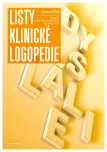Phonetic transcription and its application in SLT practice
Authors:
Mgr. Mgr. Černá Martina Et 1,2; doc. Mgr. Skarnitzl Radek, Ph.D. 1
Authors‘ workplace:
Fonetický ústav, Filozofická fakulta, Univerzita Karlova
1; Privátní logopedická praxe
2
Published in:
Listy klinické logopedie 2018; 2(1): 3-9
Category:
Main topic
Overview
Phonetic transcription may be regarded as an important tool, applicable whenever it is necessary to visually capture the sound patterns of speech. In the international context, the IPA transcription system is used for this purpose; the IPA comprises a set of symbols corresponding to speech sounds occurring in various languages of the world, as well as diacritics which allow the transcriber to capture modifications of speech sounds. In the Czech linguistic environment, conventions for transcribing with the IPA do exist, but a local system making use of Czech alphabet symbols is often preferred. This Czech phonetic transcription is frequently used for transcribing standard pronunciation and minor deviations from it. However, transcription of speech which falls within the domain of speech pathology has not been sufficiently discussed in Czech literature, and transcription is not commonly applied in SLT practice. The objective of this paper is therefore to introduce to SLT practitioners transcription as such and principles of transcribing canonical Czech pronunciation. In the second part, we discuss possibilities of recording speech defects and propose a way of transcribing common pronunciation defects in Czech; we are convinced that this tool may be valuable for the purpose of effective diagnostics and therapy.
Keywords:
Phonetic transcription – articulation disorders – transcription of Czech – IPA – speech and language therapy
Sources
-
Ball, M. J., Esling, J. & Dickson, C. (1995). The VoQS system for the transcription of voice quality. Journal of the International Phonetic Association, 25, 71–80.
-
Ball, M. J., Esling, J. H. & Dickson, B. C. (v tisku). Revisions to the VoQS system for the transcription of voice quality. Journal of the International Phonetic Association.
-
Ball, M., Müller, N., Klopfenstein, M. & Rutter, B. (2009). The importance of narrow phonetic transcription for highly unintelligible speech: Some examples. Logopedics Phoniatrics Vocology, 34, 84–90.
-
Duckworth, M., Allen, G., Hardcastle, W. & and Ball, M. (1990). Extensions to the International Phonetic Alphabet for the transcription of atypical speech. Clinical Linguistics and Phonetics, 4, 273–280.
-
Heselwood, B. (2013). Phonetic Transcription in Theory and Practice. Edinburgh: Edinburgh University Press.
-
Howard, S. J. & Heselwood, B. C. (2013). Learning and teaching phonetic transcription for clinical purposes. Clinical Linguistics & Phonetics, 16, 371–401.
-
IPA (1999). Handbook of the International Phonetic Association. Cambridge: Cambridge University Press.
-
Laver, J. (1980). The Phonetic Description of Voice Quality. Cambridge: Cambridge University Press.
-
Skarnitzl, R. (2013). Asymmetry in the Czech alveolar stops: An EPG study. Acta Universitatis Carolinae – Philologica, Phonetica Pragensia XIV, 101–112.
-
Skarnitzl, R. (2016). Co dokáže náš hlas? Fonetický pohled na variabilitu řečové produkce. Slovo a smysl, 26, 97–115.
-
Skarnitzl, R., Šturm, P. & Volín, J. (2016). Zvuková báze řečové komunikace: Fonetický a fonologický popis řeči. Praha: Karolinum.
-
Skarnitzl, R. & Volín, J. (2012). Referenční hodnoty vokalických formantů pro mladé dospělé mluvčí standardní češtiny. Akustické listy, 18, 7–11.
-
Skarnitzl, R. & Volín, J. (2018, v tisku). Fonetický aspekt verbální komunikace. In: Neubauer, K. (Ed.), Kompendium klinické logopedie. Praha: Portál.
-
Volín, J. (2010). Fonetika a fonologie. In: Cvrček, V. (Ed.), Mluvnice současné češtiny, 35–64. Praha: Karolinum.
Labels
Clinical speech therapy General practitioner for children and adolescentsArticle was published in
Clinical speech therapy (Listy klinické logopedie)

2018 Issue 1
- Hope Awakens with Early Diagnosis of Parkinson's Disease Based on Skin Odor
- What Effect Can Be Expected from Limosilactobacillus reuteri in Mucositis and Peri-Implantitis?
- The Importance of Limosilactobacillus reuteri in Administration to Diabetics with Gingivitis
- Deep stimulation of the globus pallidus improved clinical symptoms in a patient with refractory parkinsonism and genetic mutation
-
All articles in this issue
- Phonetic transcription and its application in SLT practice
- Diagnostic reflections on the specific developmental speech and language disorders
- A practical information from pediatric plastic surgeon about frenulotomia in cases with frenulum sublinguale breve
- Speech pronunciation disorders in German language – the review
- Developmental speech /language/ communication disorders in the current concept of neurodevelopmental disorders - or what to do with the snakelets in the brain
- Orofacial myofunctional disorders in preschool-age children and their influence on oral speech
- Kovářova kobyla chodí bosa aneb matka logopedka
-
Klinická logopedie je krásný obor, hlavně pro lidi, kteří jsou všestranní a kreativní
Rozhovor s PaedDr. Marcelou Michaličkovou - Adaptace diagnostického nástroje
- Terapia jąkania metodą Tarkowskiego
- Kindliche Aussprachestörungen im Deutschen - Ein Überblick
- Clinical speech therapy (Listy klinické logopedie)
- Journal archive
- Current issue
- About the journal
Most read in this issue
- A practical information from pediatric plastic surgeon about frenulotomia in cases with frenulum sublinguale breve
- Developmental speech /language/ communication disorders in the current concept of neurodevelopmental disorders - or what to do with the snakelets in the brain
- Terapia jąkania metodą Tarkowskiego
- Orofacial myofunctional disorders in preschool-age children and their influence on oral speech
